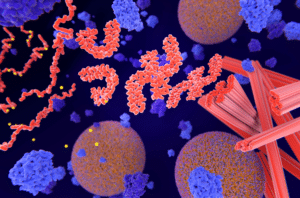More than 1.8 million people worldwide are diagnosed with multiple sclerosis (MS), a chronic autoimmune disease that impacts everyday function, including balance, cognition, and physical strength. Previous research has indicated a link between MS and the Epstein–Barr virus (EBV), a highly contagious double-stranded DNA virus thought to cause an autoimmune reaction in some patients. Now, scientists from the Center for Virology and the Department of Neurology at the Medical University of Vienna have mapped that link, potentially paving the way for a multiple sclerosis vaccine based on the EBV connection.
The Current State of Multiple Sclerosis Vaccines
There is no clinically approved multiple sclerosis vaccine on today’s market. However, some prospects are underway — for example, a new type of vaccine developed by researchers at the University of Chicago that could “reverse” autoimmune diseases like MS. But while that vaccine may prove promising, the treatment would be reactive, not preventative. At this time, no preventative MS treatments exist, partially because the exact cause of MS remains a mystery. Fortunately, scientists are working to understand the connection between MS and EBV to develop a preventative vaccine, potentially impacting countless patients in years to come.
Understanding Multiple Sclerosis and the Epstein-Barr Virus
While scientists don’t yet fully understand the underlying cause of MS, extensive research has revealed a possible connection between patients infected with the common EBV and patients who later develop MS.
EBV is extremely common and highly contagious; experts believe that at least 90 percent of the world’s population has been or will become infected with the virus. However, while nearly all humans will likely become infected with EBV at some point, only a small group of people develop MS after the infection. That connection is at the core of the research recently published in the journal Cell. The researchers involved in the project set out to explore possible targets for a future MS-prevention vaccine — and they were successful, largely because they explored the connection between MS and EBV.
Autoreactive Immune Responses and MS Risk
The team’s research indicates that EBV patients may be at a greatly increased risk of MS if they meet two specific criteria. First, their EBV-specific autoreactive immune response must be strong. Second, the patients must not be in full control of this autoimmunity. In other words, the patients must exhibit an overactive autoimmune response. That overactive autoimmune response could, the group theorized, later result in chronic autoimmune conditions like MS — conditions in which the body’s own immune processes attack healthy tissue.
The team found that the development of MS after EBV infection could also have a genetic cause or be based on a specific EBV variant; however, the aforementioned autoreactive processes seem to be the key that could unlock potential MS vaccines in the future. If scientists can learn how to temper those overactive immune responses, it could prove highly impactful for future MS vaccines and detection research. While researchers have miles to go before developing a preventative multiple sclerosis vaccine, mapping the connection between MS and EBV is a hugely influential first step.
Scantox is a part of Scantox, a GLP/GCP-compliant contract research organization (CRO) delivering the highest grade of Discovery, Regulatory Toxicology and CMC/Analytical services since 1977. Scantox focuses on preclinical studies related to central nervous system (CNS) diseases, rare diseases, and mental disorders. With highly predictive disease models available on site and unparalleled preclinical experience, Scantox can handle most CNS drug development needs for biopharmaceutical companies of all sizes. For more information about Scantox, visit www.scantox.com.









